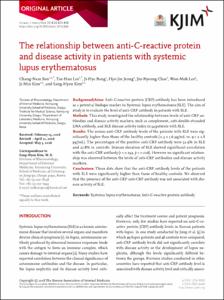KUMEL Repository
1. Journal Papers (연구논문)
1. School of Medicine (의과대학)
Dept. of Internal Medicine (내과학)
The relationship between anti-C-reactive protein and disease activity in patients with systemic lupus erythematosus
- Keimyung Author(s)
- Kim, Ji Min; Kim, Sang Hyon; Son, Chang Nam; Lee, Won Mok
- Journal Title
- Korean J Intern Med
- Issued Date
- 2018
- Volume
- 33
- Issue
- 4
- Abstract
- Background/Aims
Anti-C-reactive protein (CRP) antibody has been introduced as a potential biologic marker in Systemic lupus erythematosus (SLE). The aim of study is to evaluate the level of anti-CRP antibody in patients with SLE.
Methods
This study investigated the relationship between levels of anti-CRP antibodies and disease activity markers, such as complement, anti-double-stranded DNA antibody, and SLE disease activity index in 34 patients with SLE.
Results
The serum anti-CRP antibody levels of the patients with SLE were significantly higher than those of the healthy controls (11.3 ± 5.6 µg/mL vs. 9.1 ± 2.8 µg/mL). The percentages of the positive anti-CRP antibody were 52.9% in SLE and 27.8% in controls. Disease duration of SLE showed significant correlation with the anti-CRP antibody (r = 0.234, p = 0.026). However no significant relationship was observed between the levels of anti-CRP antibodies and disease activity markers.
Conclusions
These data show that the anti-CRP antibody levels of the patients with SLE were significantly higher than those of healthy controls. We observed that the presence of the anti-CRP anti-CRP antibody was not associated with disease activity of SLE.
- Publisher
- School of Medicine (의과대학)
- Citation
- Chang-Nam Son et al. (2018). The relationship between anti-C-reactive protein and disease activity in patients with systemic lupus erythematosus. Korean J Intern Med, 33(4), 823–828. doi: 10.3904/kjim.2016.065
- Type
- Article
- ISSN
- 1226-3303
- Source
- http://kjim.org/journal/view.php?doi=10.3904/kjim.2016.065
- 파일 목록
-
-
Download
 oak-2018-1540.pdf
기타 데이터 / 220.27 kB / Adobe PDF
oak-2018-1540.pdf
기타 데이터 / 220.27 kB / Adobe PDF
-
Items in Repository are protected by copyright, with all rights reserved, unless otherwise indicated.